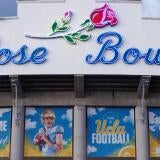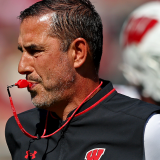Roy Kramer: BCS had growing pains but did what it was intended to do
There was controversy to be sure, but before the BCS arrived No. 1 had met No. 2 in a bowl game only eight times.

NEWPORT BEACH, Calif. -- In many ways, the Bowl Championship Series was Roy Kramer's baby. He was there when she was born. He nurtured her against some pretty harsh critics. He knew there would be growing pains along the way but he also knew that over the long haul the good she would produce would far outweigh the bad. And it has.
"When we started we knew there would be controversy and we certainly didn't know how long it would last," Kramer told me by phone from Michigan, where he was celebrating the Christmas holidays with his children. "But there can be no doubt that the BCS changed college football for the good. The game is now more popular than it has ever been."
Like a proud papa, the former commissioner of the SEC will be at the Rose Bowl on Monday night to watch as the BCS crowns its 16th and final college football champion. His little girl is all grown up and ready to leave home as next year the BCS will be replaced by a four-team College Football Playoff.
"In the final analysis the BCS did exactly what it was designed to do," said Kramer, still razor sharp at 82. "We wanted a process that would guarantee a matchup of No. 1 and No. 2 for the national championship. We knew there would be years where people would not agree on who No. 1 and No. 2 were. That was inevitable. But with a few exceptions, the BCS got it right.
"More than anything, the BCS turned college football from a strong regional game to a national game," said Kramer. "Some of the highest ratings for this year's Iron Bowl (Alabama vs. Auburn) were in Columbus, Ohio. What did Auburn fans do after they won the SEC Championship? They ran to the closest TV they could find to watch the Big Ten championship game. That's because of the BCS."
And while one of the most stinging criticisms of the BCS over the past 16 years was that it consolidated power (and money) into the largest conferences, Kramer said the opposite is true.
"The reality is that without the BCS, Boise State never would have gotten the opportunity to beat Oklahoma in the Fiesta Bowl," said Kramer.
"Hawaii would have never played in the Sugar Bowl. TCU would have never played in the Rose Bowl. The BCS opened up the game and provided opportunities that never existed before."
There were two early versions of the BCS before the system we know today was launched in 1998. The Bowl Coalition (1992-1994) followed by the Bowl Alliance (1995-97) created a better opportunity for No. 1 and No. 2 to play in a postseason bowl, which had previously happened only eight times in history.
But the Coalition and the Alliance were a mixed bag because the Big Ten and Pac-10 did not want to give up their traditional New Year's Day game in the Rose Bowl. That finally changed in 1998, which allowed the BCS to be born.
And it was Kramer who did a lot of the arm twisting.
"They have a wonderful tradition in the Rose Bowl and they were worried that if they joined the BCS someday the Rose would have to give up a national championship game," said Kramer. "We showed them that only one time in 50 years had the Big Ten and the Pac-10 finished 1-2."
When the first BCS standings of the 1998 season were released that October, UCLA of the Pac-10 was No. 1 and Ohio State of the Big Ten was No. 2. The national championship game was committed to the Fiesta Bowl.
"They were all pretty nervous at that point," said Kramer. "So I told them, 'hey, if it happens then it will be another 50 years before it happens again.' I'm afraid they didn't see the humor in that."
Ohio State lost to Michigan State on Nov. 7 and UCLA was upset by Miami 49-45 on Dec. 5, knocking both teams out of the BCS championship. No. 1 Tennessee and No. 2 Florida State played in the Fiesta Bowl for the national title.
Then there was the matter of the formula. The Coalition and the Alliance had simply used the Associated Press media poll and the coaches' poll to determine No. 1 and No. 2. But in the spring of 1998 Kramer and the other commissioners determined that human polls would not be enough to determine No. 1 and No. 2 moving forward.
"It became clear that the media was growing uncomfortable voting on a poll that would determine the teams that played for the national championship," said Kramer. "We had to come up with something that had more than the subjective human polls."
Hunkered down in the SEC offices, Kramer worked with associate commissioners Charles Bloom and Mark Womack to come up with a formula that was a combination of human polls and computer polls. Computer poll whiz Jeff Sagarin was brought in to help.
"I can't tell you how many formulas we looked at but it was a lot," said Kramer. "We went back about 10-12 years and most of the time, with only a couple of exceptions, the formula agreed with the human polls."
And thus the BCS formula, which has occupied more hours of talk radio than any other single subject in the past 16 years, was launched in 1998.
Kramer is right when he says most of the time the BCS formula produced a national championship game the public could agree upon. But when it didn't the howls were loud and lingering and there were constant calls to tweak the system:
• In 2000 once-beaten Florida State finished No. 2 in the BCS standings despite the fact that Miami was ranked No. 2 in the both human polls AND had beaten Florida State head to head in the regular season. Florida State lost to Oklahoma for the championship.
• In 2001 Nebraska, which didn't even win its division in the Big 12, played in the BCS championship game instead of a once-beaten Oregon team that was ranked No. 2 in both human polls and was the Pac-10 champ.
Nebraska was No. 4 in the human polls after losing to Colorado 62-36 in its last regular-season game. The Cornhuskers were embarrassed in the BCS championship game against No. 1 Miami, trailing 34-0 at halftime before losing 37-14.
• In 2003 USC was ranked No. 1 in both human polls but when all the numbers were crunched the Trojans were No. 3. Oklahoma was No. 1 and LSU was No. 2. The Associated Press poll declared USC national champs and the BCS crowned LSU.
• In 2004 Auburn went 13-0 and won the SEC championship but finished No. 3 behind USC and Oklahoma, which started the season ranked 1-2 and both went undefeated.
• In 2011 Oklahoma State was ranked No. 2 and on track to reach the BCS championship game until it was upset at Iowa State (37-31 in 2 OTs) on Friday, Nov. 18. The result was an All-SEC LSU-Alabama rematch for the national championship. Kramer believes that having two teams from the same conference play for the BCS title was the tipping point toward the four-team playoff that will start next season.
"If Oklahoma State beats Iowa State and plays LSU for the national championship, I'm not sure the momentum would have been there for the change," said Kramer.
One thing is for sure. The BCS has been good to Kramer's old conference, where he was commissioner from 1990 to July of 2002, when Mike Slive took over. The SEC has won nine of the 15 BCS championships and goes into Monday night's game between Florida State and Auburn with a chance to post its eighth straight national title.
"People try to tell me that the BCS was set up to help the SEC but obviously I don't see it that way," said Kramer. "It has more to do with how passionate and committed people are to college football in the Southeastern United States. The SEC has needed some fortune at times to get to the big game, but once they get there they win it."
Any regrets about the BCS? Not really, said Kramer. His only regret about Monday night is that his beloved wife, Sara Jo, will not be in the Rose Bowl to watch the BCS era come to an end. Sara Jo Kramer, always known as the "First Lady of SEC Football," passed away last year. They had been married for 62 years.
"I miss my girl," said Kramer.
















